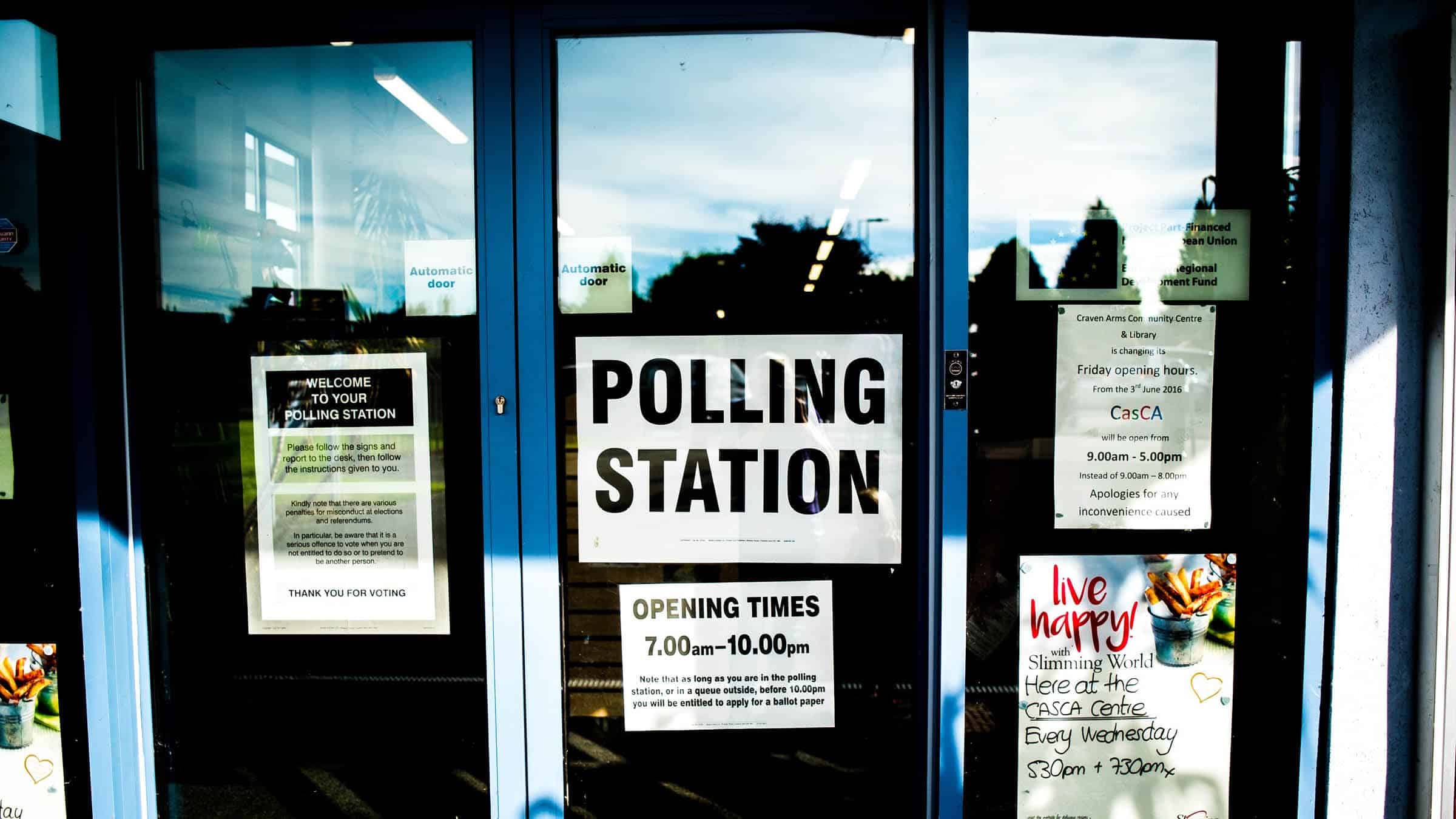“It’s completely strategic and malicious”: 11 youngsters weigh in on the Tories’ new voter ID system

This May, local elections will take place. But it’s not the same as before, as Britain’s election watchdog has forewarned of possible issues when the new voter ID system will be introduced, especially for the identification of those in the LGBTQIA+ community. There is widespread concern that trans and non-binary people could be deterred from exercising their democratic rights, as polling station clerks will verify voters’ photos and ensure that the name on the ID matches what is on the electoral register.
Though gender identification is irrelevant in terms of voting, the law now states that people will not be allowed to cast their vote if the clerk thinks there is “reasonable doubt” that the person doesn’t match the identity claimed on their photo ID. But many may not even make it to the polling station, thanks to an ID that isn’t valid or personal preference when producing an ID they identify with.
Parliament passed the Elections Act 2022 in April that detailed the new voter ID ruled for this set of May elections in 2023. With a delay in the implementation of the new pass, the requirements in the secondary legislation were only put forward in late 2022 as opposed to over the summer as promised. With this delay, the understanding of the rules around voter ID means these important considerations cannot be fully met in time for the May elections. Many presiding officers may not be trained in time to understand what “reasonable doubt” entails. There is clear guidance for ID when travelling, but none has been set out for voting yet.
Local administrations have not been given the proper resources and clarity to sufficiently carry out these enforcements, as many are vying to delay the changes further until a comprehensive understanding is made clear. The idea was formed over six years ago by the Tories, who drew plans to bring ID cards to ballot boxes to restore “integrity” to the political system and tackle “voter fraud”. Yet, critics of the legislation have argued that voter fraud is extremely rare, and there had only been one conviction in 2017 and 2019 – the two busiest years for elections.
The Labour party argued that the mandatory requirement now threatens 3.5 million people who do not carry voter ID from exercising their right to vote. The types of ID will include passports, driving licenses, biometric immigration documents and concessionary travel passes. The Cabinet Office admitted to finding that 42% of people with no photo ID are unlikely to apply for one in time.
In a report released by Stonewall and LGBT Foundation, they found LGBTQIA+ people are three times more likely than the general population to be without a useable photo ID. A quarter of trans people and one in five non-binary people said they didn’t possess a useable ID on the survey. 39% of queer people, 52% of non-binary people, and 55% of trans people said they would be less likely to vote when forced to bring ID.
With the May elections fast approaching and details of the requirement still in question, HUNGER speaks to a group of young people from across the country to see whether they will be deterred from voting, and what it could mean for them and their friends.
“The decision feels completely strategic and malicious. It is essentially suppressing voting under the guise of organisation. Naturally, making it harder for people to vote is going to affect those with less free time – namely young people who are studying or working several jobs to stay afloat. And, because most of the photo ID forms require a passport, the decision rules out those who can’t afford a passport in the first place. It feels so backward that you’ll have to pay £80 to exercise your democratic right to vote.” – Matilda, writer based in London
“I think it is disgusting how the Tories are demanding ID for young queer people who have not yet found their identity. For their opinion to be ruled by their identity is completely wrong. The government knows exactly what they are doing by demanding ID as a lot of younger people these days do not feel comfortable in their assigned gender or pronouns and will therefore be completely put off by the idea of their unwanted name or pronoun being used for a vote. This is a clever yet unfair tactic used by the Tories to make the narrow-minded middle-aged generation’s votes more important than the younger generation. I personally think it should not matter who you are or what background you come from. The votes should be anonymous and that way a lot more people will vote, especially people who are currently struggling with who they are or what society wants them to be.” – Drew, knitwear designer based in Liverpool
“I think it will negatively impact a lot of the working-class population and young people, especially queer trans people who have issues acquiring legal photo ID after the likes of name-changing. It all costs money and if you don’t have the money to do it then you are basically losing the right to vote.” – Lana, transfemme DJ based in Dundee
“I don’t think it’s necessary in any way to have a voter ID when voting, and I don’t know what the government’s intentions are with this but it doesn’t look good. Personally, it won’t affect me but I can see how much this is going to affect others.” – Lis, photographer based in London
“I think it is blatant voter suppression as a tactic for them to secure another win, as they’re clearly lacking in favour at the moment. Also quite obviously anti-working class, due to the fact that so many people don’t have the luxury of owning self-identification as many can’t afford a passport, and acquiring other, cheaper forms of ID (on the pre-approved list) requires you to have one. And yet another hit from the Tories on the trans community, as you won’t be able to cast your vote if the officer at the polling station thinks there’s a “reasonable doubt” that you aren’t the person you claim to be, based on your ID. So for the people who haven’t the ability to legally change their name, or update their photo ID, which again costs money, you may be refused your right to vote… more importantly, vote against a government that is already against your rights as a trans person living in the UK. All this is a clear hit on marginalised communities, as they know their desired voter will have the means to vote, therefore aiding them in the election. It all feels a bit too dictated for me.” – Millie, writer based in Wales
“In a cost of living crisis, I don’t know why the government is shifting focus from problems they have caused to working-class or minorities having to get a voter ID when it’s the last thing on their list. It just feels like a way to deter – because even if we were to disagree and make a stand, it will only affect us in the end.” – Alicia, writer based in Manchester
“It will not deter me. I would crawl off my deathbed if needs be to tactically vote a conservative MP out. In terms of younger voters in general, an inspirational opposition should motivate you to get your vote counted no matter how difficult it is. But the conservative party knows that placing petty blocks in front of us young voters will reduce voting, we as students need an easy way to vote as the majority of us hold down a weekend/ evening job after studies. Absolutely nobody wants to faff around with an extra layer of identification.” – Louis, writer based in London
“I understand the positives of mandatory photo ID as it prevents people from taking a vote from others – I’ve previously worked as a poll clerk and this has happened due to no way of people able to identify the voter. However, this causes so many more problems than positives as members of the trans/ non-binary community are immediately taken out of the equation. Not identifying as your assigned gender at birth does not mean that voting is still not a basic right, and they shouldn’t be restricted access to this. The younger generation are the Tories’ biggest competition so excluding them from the vote doesn’t seem like a coincidence to me.” – Gemma, artist based in Manchester
“It’s not going to deter me from voting personally, but I do have friends in the LGBTQIA+ community that this will seriously affect. I’m lucky to be assigned this privilege at birth, but it shouldn’t be a privilege to have the correct ID and the basic right to vote.” – Jade, lingerie designer based in Liverpool
“I explore my gender a lot, but ultimately I won’t be deterred by having to put my biological identification anywhere ie, voting registration. I think, however, it will definitely deter a large margin of young people who are non-binary or trans, but I’m not sure to what extent. I suppose it is a battle between stating your sex or gender and how politically inclined you are so it’s just a difficult situation.” – Maisie, designer based in London
“It wouldn’t put me off because I don’t feel any insecurity or discomfort in presenting my gender on a form or otherwise. But I can definitely understand why there are people that would feel that way.” – George, hospitality worker based in Edinburgh

